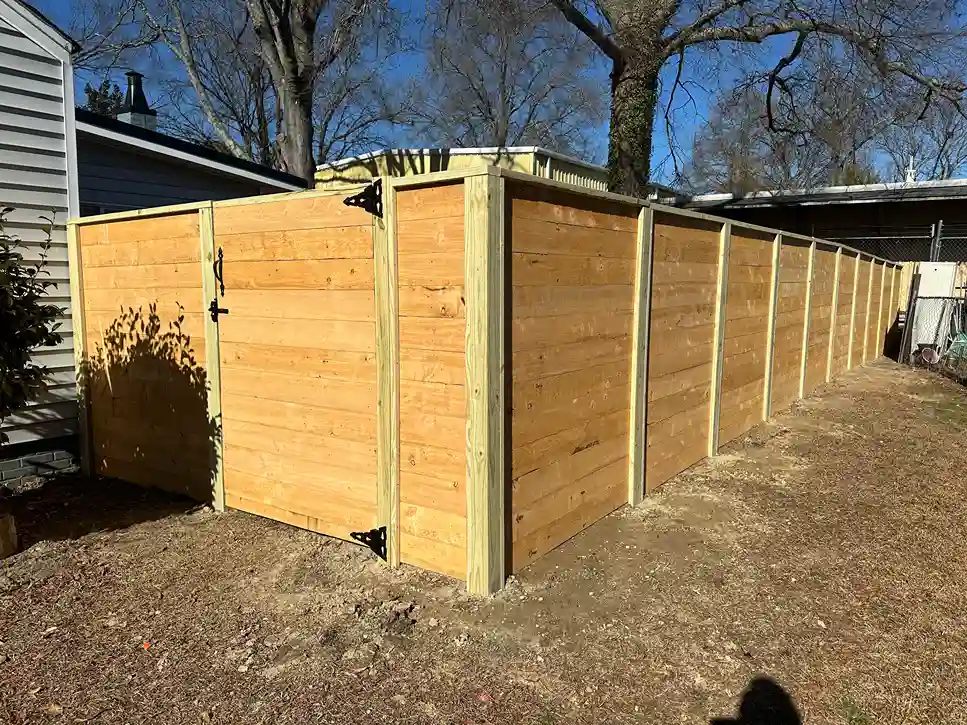In Raleigh, the best fence material is about more than curb appeal—it’s about durability. Your fence has to handle muggy summers in North Hills, sudden freezes near Falls Lake, and the heavy spring rains that sweep through Five Points. The wrong choice can leave you with warped boards, mildew stains, or posts shifting in clay soil.
That’s why picking the right fence isn’t just a design choice; it’s an investment in durability. A well-chosen fence stands tall for decades, saving you on repairs while keeping your home looking its best. At AAA Fence & Deck, we’ve helped homeowners choose weather-resistant fencing in Raleigh that lasts through the area’s toughest conditions. Let’s break it down.
Raleigh’s Climate & Soil Factors

Raleigh’s weather swings put any fence to the test. Humid summers soak untreated wood, inviting mold and swelling. By winter, temperatures dip low enough for freeze-thaw cycles that crack boards and stress posts. Spring storms and fall rains bring standing water that seeps into soil, weakening foundations.
Then there’s the Piedmont clay. In areas like Brier Creek or along Glenwood Avenue, dense clay soils hold water and shift under pressure. Without proper installation, posts can lean or sink over time. Any fence that isn’t designed for these conditions is bound to fail early.
Fence Materials Compared in Raleigh’s Climate
Homeowners face unique conditions, so here’s how the most common materials stack up side by side.
| Material | Pros | Challenges | Best Practices | Best For |
| Wood | Classic curb appeal, customizable, affordable upfront | Warps/rots in humidity, insect damage | Use cedar/cypress, apply sealant, ensure drainage | Homeowners prioritizing aesthetics, historic districts like Oakwood or Boylan Heights |
| Vinyl | Moisture-resistant, minimal upkeep, no rot | Can fade in hot sun, brittle in cold snaps | Choose UV-protected vinyl, lighter shades | Busy families wanting low maintenance |
| Aluminum | Rust-resistant, durable in wet climates, lightweight | Less privacy, may shift in clay soil | Professional install, reinforced posts | Pool enclosures, decorative perimeter near Umstead Park homes |
| Composite | Eco-friendly, strong blend of wood fibers & plastic, long life | Higher upfront cost, limited style options | Invest in pro installation, routine cleaning | Long-term homeowners in upscale areas like North Ridge or Stonehenge |
Remember that each material has its place. The best option depends on your budget, your style preferences, and how much maintenance you’re willing to commit to.
Cost vs. Lifespan in Raleigh

Cost isn’t just about the day you install a fence. It’s about how long that fence lasts before you have to replace it.
- Wood: Usually the least expensive upfront. Expect 10–15 years if you reseal and maintain it regularly. In humid pockets near Walnut Creek, neglecting care could cut that in half.
- Vinyl: A mid-range choice that lasts 20+ years with little maintenance. Great for homeowners who don’t want annual upkeep.
- Aluminum: A higher upfront cost, but extremely durable. With proper installation, aluminum fences can last 30+ years, making them ideal for permanent properties.
- Composite: Premium pricing, but combines the strength of plastic with the appeal of wood. Lifespans stretch 25–30 years when professionally installed.
If you want to keep your neighborhood relationships smooth while you’re at it, see our guide on Fence Etiquette in Raleigh Neighborhoods for insights on placement and HOA expectations.
Extra Considerations for Raleigh Homeowners

Building in Raleigh isn’t just about materials. It’s also about compliance and preparation.
- HOA Rules: Many neighborhoods, from North Hills to Stonehenge, require specific fence heights or approved styles.
- Permits: Raleigh requires permits for most residential fences. Learn more from the City’s Residential and Commercial Fences page.
- Soil Prep: Dense Piedmont clay means posts need reinforcement and proper drainage. Without it, your fence could tilt or sink.
- Warranties: In a climate as demanding as Raleigh’s, a strong workmanship warranty—such as a two-year, no-questions-asked guarantee—gives you the peace of mind that your investment is protected.
Raleigh NC Seasonal Fence Care Guide

A fence faces different challenges each season. Regular upkeep can extend its life by years.
- Spring: Heavy rains bring moss and mildew. Clean surfaces, check for soil erosion around posts, and reseal wood fences.
- Summer: High humidity and strong UV rays are hard on all materials. Wash vinyl and composite, trim vegetation away from wood, and apply UV protectants.
- Fall: Hurricanes and storms can topple weak posts. Inspect for loose gates, tighten hardware, and clear leaves that trap moisture.
- Winter: Freeze-thaw cycles shift soil and stress posts. Make sure water drains away, check for frost heave, and tighten fasteners.
Building Fences That Weather Storms

From sticky summers to icy winters, fences need to be built with weather resistance in mind. Choosing the right material means fewer headaches, lower repair costs, and more time enjoying your yard.
At AAA Fence & Deck, we combine veteran-owned expertise, premium materials, and proven installation techniques to build fences that last. Whether you need privacy, security, or a decorative touch, we’ll design and install a solution built for Raleigh’s conditions.
Contact (984) 333-5313 or visit us today for a free consultation.
Frequently Asked Questions
Is wood still a good option in Raleigh?
Yes, but it requires commitment. With consistent care, wood fences last 10–15 years. In shaded, damp areas of Raleigh like parts of Cary, the lifespan may be shorter without regular sealing.
How much does a weather-resistant fence cost in Raleigh?
Costs vary by material and yard size. Wood is usually more affordable upfront, while vinyl and aluminum cost more initially but save money long term with less maintenance.
Which fence materials require the least maintenance?
Aluminum and vinyl are the easiest. Both resist moisture, don’t need sealing, and stand up well to seasonal swings.
How does Raleigh’s clay soil affect fence durability?
Clay-heavy soil can shift during heavy rains or freeze-thaw cycles, causing posts to lean. Reinforced posts and professional installation help prevent this.
